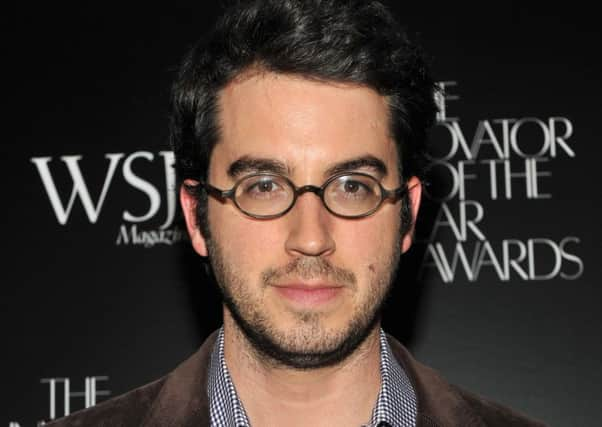Jonathan Safran Foer's hotly anticipated novel worth the wait


One of the coups of this year’s Edinburgh International Book Festival was to celebrate, on its closing weekend, the launch of the hotly-anticipated new novel by Jonathan Safran Foer. Copies of Here I Am, Safran Foer’s first novel for 11 years, were kept under strict embargo until after the event on Sunday evening, when he gave the first public reading from the book.
Here I Am is the story of a middle-class Jewish couple, Jacob and Julia Bloch, who find the pressures of family life gradually overwhelm their relationship with one another. On the one hand, he dissects marriage and family life with typical wit and insightfulness while, on the other, creating a dark backdrop: a speculative history in which an earthquake in the Middle East puts the very existence of the state of Israel at risk. But he was quick to play down the book’s political aspects, describing them as “not central, just a different way to get at the central themes”.
Advertisement
Hide AdAdvertisement
Hide AdIt’s good. Of course, it’s good. The real question on everyone’s minds is why did it take the writer of the ground-breaking Everything is Illuminated and Extremely Loud and Incredibly Close 11 years to write another novel? Did he, as some speculated, have writer’s block?
The slightly-built, boyish-faced 39-year-old spoke frankly and warmly about the difficulties of writing. He likened impulse to write to the idea that pops into your head just as you’re dropping off to sleep at night: “Writing for me is repeating the act of getting out of a warm, comfortable bed many, many times a day.”
He said that he had no real memory of writing Everything is Illuminated, which was done while he was a student at Princeton: “I remember going to the computer lab to print it out and thinking, ‘Where did that come from?’ My second book followed quickly on its heels, it also just appeared, a result of intuition and inertia. Then it became clear that, for a variety of reasons, that process wasn’t going to work any more.”
He said that he wrote Here I Am quite quickly: “It just took an awful long time to reach the start”. In that time of waiting “for a subject I could care about enough”, he wrote a television series for HBO, All Talk, in which Ben Stiller was said to be scheduled to star, only to pull out of the project a month before filming began when he realised: “I don’t want to spend my life making TV shows, I want to be a novelist.”
Earlier in the evening, two more novelists presented new works. Singer-songerwriter James Yorkston’s first work of fiction is Three Craws (he previously published a touring memoir, It’s Lovely To Be Here), which follows three young men from Fife returning home in the late 1980s. “I took the easy way out,” he joked. “I’m writing about the area I’m from in the time I lived there.”
Belgian writer Tom Lanoye does the opposite in his latest novel, Fortunate Slaves, which ranges across the world from Argentina to Macau via a game reserve in South Africa. The tale of two doppelganger characters, both called Toni Hanssen, was described by a French newspaper as Balzac meets Quentin Tarantino. “Having written books set in Flanders, I wanted to write a book where the world is there and the continent we think is most important is not there.”
The surprise joy of the event was to hear him read not only from that book but from Speechless, his moving memoir about his charismatic mother, in its hot-off-the-press English translation. A talented amateur actress, she gave Lanoye, who is also a playwright, his love of theatre, practising her lines while ironing and getting her son to read the other parts. It’s the heartbreaking story of how, following a stroke and brain haemorrhage, a woman never knowingly lost for words gradually lost all her powers of speech.
Advertisement
Hide AdAdvertisement
Hide AdThe day had begun with biographer Claire Harman offering fresh and fascinating insights into the life of Charlotte Brontë. Having dismissed Brontë as “too much done” in terms of biography, she discovered that recent scholarship on Brontë’s copious letters allowed fresh areas of insight to open up. She sketched a vivid picture of the children of Haworth parsonage, the closeness of the siblings, the imaginative worlds they created and wrote down in miniature books. Brontë, she said, while fearing a life sentence as a schoolteacher, still had the nous at the age of 19 to write to the Poet Laureate Robert Southey, to ask how to promote her writing. “Literature is not the business of a woman’s life, nor should it be,” came the sniffy response.
Harman described, in particular, four letters written by Brontë to Contantin Heger, the schoolmaster in whose boarding school she and Emily had enrolled in Brussels, and to whom she became close (he is thought be a model for Mr Rochester in Jane Eyre and for her later novel The Professor).
Written after her return to Haworth, the letters are, Harman said, “one of the great unrequited love laments in literature”. The fact that Heger did not respond to Brontë likely broke her heart, though it also gave her renewed determination to publish her writing.